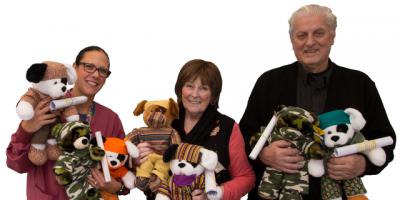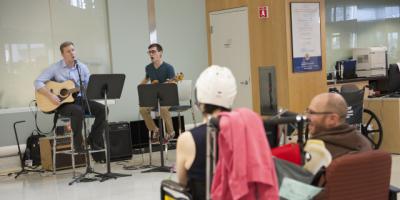10 days in Ghana: Upstate volunteers help build community in Africa

Upstate nurse Meghan Lewis gives a Days for Girls reusable menstrual kit to a young mother at a market in Kumasi, Ghana. (PHOTO BY SUSAN KEETER)
Near the end of an 11-hour flight from New York‘s John F. Kennedy International Airport, we finally see Ghana out the plane‘s windows: saffron-colored earth and lush green foliage dotted with bright blue and pastel pink buildings. The country‘s beauty is overwhelming.
We descend into Accra, the African nation‘s capital, and the plane passes over the Gulf of Guinea, which I later learn has the most beautiful white sand beach that I have ever seen.

Nearly 1,000 girls assembled in an open-air classroom at Namong Senior High School in Offinso, Ghana, to receive menstrual education from a team of ASAP volunteers. Students with the greatest need received reusable menstrual kits made by the nonprofit organization Days for Girls. At right in the blue flowered dress is Nancy Addo, headmistress of the school. At far right, seated, is Upstate nurse Maisha Brown, a volunteer for ASAP, which stands for the Americans Serving Abroad Program. (PHOTO BY MEGAN LEWIS)

Lauri Rupracht, an Upstate pediatric nurse and founder of ASAP, holds a baby during a November 2017 mission trip in Ghana. (PHOTO BY MEGHAN LEWIS)
We are on a 10-day mission trip to work with women and children in rural Ghana to address needs identified by the Ghanaian nonprofit organization Sem Fronteiras: menstrual education, oral health, dementia awareness and literacy.

Maisha Brown, a pediatric nurse at Upstate, shows a chart of the reproductive system to female students at Fufulso Presbyterian Primary School. The students and teachers speaks different Ghanaian languages, but all read and speak English. (PHOTO BY MEGHAN LEWIS)
We board a small school bus and take off on the highway, which was built with support from the United States during the administration of President George W. Bush.

Cyndy Carr, an oncology nurse at Upstate, with a group of Ghanaian students who received toothbrushes and toothpaste -- and instruction on good brushing habits -- as part of an oral health program. (PHOTO BY MEGHAN LEWIS)
Street vendors maneuver between the lanes of whizzing cars, selling plantain chips, chocolate bars and small plastic bags of drinking water (tap water in Ghana is not safe to drink). Most are women carrying their wares on their heads.
It is a six-hour drive north to Offinso, the district where we will be doing most of our work. We quickly become accustomed to the unpredictable functioning of things in Ghana. A public bathroom may have sinks, but no running water. The guest house may have air-conditioning, but multiple power outages. Ghana is, as Rupracht tells us, “a good place to practice flexibility.”
The villages are quieter and more peaceful than the capital, and I continue to be wowed by the beauty that is everywhere: the artistry of kente cloth clothing, the rich colors of buildings, the golden dirt paths and tropical flowers. Everywhere, groups of children play outside, women walk and talk, and clusters of men sit together in the shade. The atmosphere is warm and sociable.

Meghan Lewis, an oncology nurse at Upstate, and Traci Bender, a social worker from Buffalo, give fluoride to two of the 372 students who received treatments. (PHOTO BY AGYAPONG GYAMFI)
We do a presentation on the menstrual cycle, answer questions and distribute reusable menstrual kits, multivitamins and mosquito tents to protect the women and children from malaria, a leading cause of death in children under 5. Over 10 days, we provide services to more than 1,500 people.
The November 2017 mission was a community development trip. This spring, Rupracht is leading a larger mission of volunteers to provide medical care.
To learn how to donate or participate, go to healthlinkonair.org and search “Ghana” or visit, www.asap.ngo
Women‘s health/menstrual education
For girls in Ghana, starting their periods may lead to ending their education. Many, especially in poor, rural communities, lack access to sanitary napkins or any equipment to manage menstruation.

A young woman holds the "Days for Girls" reusable cloth menstrual kit she received at an ASAP presentation for street women in Kumasi, Ghana. (PHOTO BY SUSAN KEETER)
To begin to combat this problem, volunteers used flip books to teach students about the menstrual cycle, female anatomy and ways to care for the body. Upstate nurse Meghan Lewis answered questions such as, “If the menses does not come, should I drink medicine to make it come?” The team demonstrated how to use the reusable cloth menstrual kits that are made by Days for Girls sewing groups across the United States. All female students received the training, and those with the greatest need received kits. In addition to visiting schools, volunteers distributed kits and did the training with a group of women living in the streets in Kumasi.
The goal of future missions is to provide manufacturing equipment and train staff and students at a vocational school in Offinso to sew the kits.
Dental health

Students played a game of selecting foods that are good for your teeth and foods that are bad for your teeth. (PHOTO BY SUSAN KEETER)
Volunteers used illustrated posters to explain the causes and progression of tooth decay and played a game challenging students to identify foods that are good for teeth (yams and bananas) and bad for teeth (soft drinks and candy).
Students took turns demonstrating proper brushing on a large anatomic model of teeth.
Volunteers gave fluoride treatments to the youngest students and distributed toothbrushes and toothpaste donated by dental offices in Central New York.
Dementia awareness
According to Agyapong Gyamfi, ASAP founder Lauri Rupracht‘s counterpart in Ghana, dementia is a misunderstood and undiagnosed condition in Ghana, resulting in the isolation and, in some cases, mistreatment of elders. The volunteers‘ goal was to help children recognize dementia symptoms and develop constructive ways to interact with elders affected by the disease.
Rupracht created role-playing skits for the classrooms. Volunteers asked students, “Does an elderly person in your family forget things or get confused?” and described scenarios such as, “There are lots of visitors and noise in your home and the elderly person starts to get agitated.” Volunteers took turns portraying the elderly person and family members who behaved badly (yelling) or constructively (talking softly and helping the elder to a quiet place). Then, students were asked to come up with ideas for good ways to help elderly people with dementia.
Keeter, Rupracht and Gyamfi are creating a book on dementia for children in Ghana.
Literacy
English is the official language of Ghana, and classes are taught in English beginning in elementary school, but there are more than 50 Ghanaian languages. Volunteers visited schools in the Ashanti region, where Twi is the primary language spoken.

Every school received autographed copies of “My Daddy‘s Eyes” by Syracuse author Fatimah Salaam. (PHOTO BY SUSAN KEETER)

These young men are making their books during the literacy program. They walk four hours to attend school in an outdoor classroom with a dirt floor and metal roof supported by tree branches. (PHOTO BY SUSAN KEETER)

 This article appears in the spring 2018 issue of Upstate Health magazine. Hear a podcast where Lauri Rupracht and fellow Upstate nurse Caitlin Phalen talk about their mission efforts in Ghana.
This article appears in the spring 2018 issue of Upstate Health magazine. Hear a podcast where Lauri Rupracht and fellow Upstate nurse Caitlin Phalen talk about their mission efforts in Ghana.



